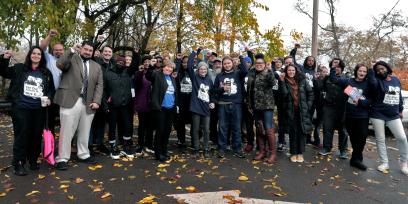It’s not too late to preserve American democracy—yet
Let’s start with a thought experiment: A candidate for president is asked to reassure voters that he has no plans to abuse his power, break the law or use the government to go after people. The answer is a no-brainer, right? Of course, this isn’t a thought experiment; it’s the exact question Fox News host Sean Hannity recently posed to Donald Trump, to which Trump replied that he would be a “dictator,” but only on “day one.” Many in his party shrugged off the statement or dismissed it as a joke. Americans may be desensitized to Trump’s words, even when he says he would be a dictator, given the maelstrom of shocking statements he makes. But he has doubled down on this troubling declaration—the latest in a pattern of his authoritarian leanings.
Trump has talked about suspending the United States Constitution, invoking the Insurrection Act to mobilize the U.S. armed forces to suppress legitimate protests, weaponizing the government to retaliate against his political enemies, bringing treason charges against news organizations, and vowing to be the MAGA movement’s “retribution.” So we have no choice but to take him at his word.
Trump has a pressing motivation—beyond vengeance or grievance—to put himself above the law: self-protection. He faces 91 felony counts in four criminal cases in Florida, Georgia, New York and Washington, which carry a total of roughly 700 years in jail time if convicted. And a $250 million civil fraud case in New York threatens his business empire.
In a second term, Trump would have a better understanding of how to overcome the institutional safeguards against his corrupt intentions, including, presumably, stopping all federal and state cases against him. Whereas he previously was restrained by officials who put the rule of law and the good of the country above fealty to the president, plans are being laid to stack the government with loyalists, hardliners, sycophants and willing enablers should he return to office.
Last month, Trump echoed language used by dictators, comparing his political opponents to “vermin.” Ruth Ben-Ghiat, a historian at New York University, notes that “calling people ‘vermin’ was used effectively by Hitler and Mussolini to dehumanize people and encourage their followers to engage in violence.”
Similarly, he understands how to exert control through fear of violence. Sen. Mitt Romney and former Rep. Liz Cheney have both said that Republican colleagues told them they wanted to vote against Trump in the Jan. 6 impeachment trial but did not because of fear for their and their families’ safety.
Such fears are understandable. Just consider the type of content Trump posts on his Truth Social platform. In a message attacking Senate Majority Leader Mitch McConnell, Trump wrote, “He has a DEATH WISH,” which many viewed as a threat. Trump also shared a message of a supporter encouraging violence on Trump’s behalf; the supporter wrote that he would “physically fight for [Trump]” and “we Are Locked and LOADED.” Numerous prosecutors, lawyers and judges in cases involving Trump have received death threats after Trump railed against them.
As 2023 closes, I would have loved to devote this column to looking back on the year. No doubt there is division and anxiety in the country, but there is so much good as well. The AFT has given out 9.8 million books to children, families and educators through the AFT’s Reading Opens the World campaign and our partnership with First Book. Our Real Solutions for Kids and Communities campaign is taking on learning loss, loneliness and literacy challenges by pressing for solutions like wraparound services, community schools, the science of reading approach and hands-on learning. Our Code Red campaign is helping to secure safe patient limits and support health professionals. And our work to help AFT members reduce or eliminate their student debt is on track to provide nearly $400 million in savings for our members.
The AFT is focused on helping people thrive—that’s the purpose of the labor movement and of public education. But for working people and our families, for people not born to wealth or power, the ability to thrive depends on pluralism and democracy. That’s why, as a union leader, a social studies teacher and an American, I feel compelled to sound this alarm and commit to doing everything I can to safeguard democracy against the gravest threat since the Civil War. The next presidential election is less than a year away. If Trump is the Republican nominee, the election will become an existential referendum on whether the United States will remain a democracy or risks becoming a dictatorship. It is not yet too late.

